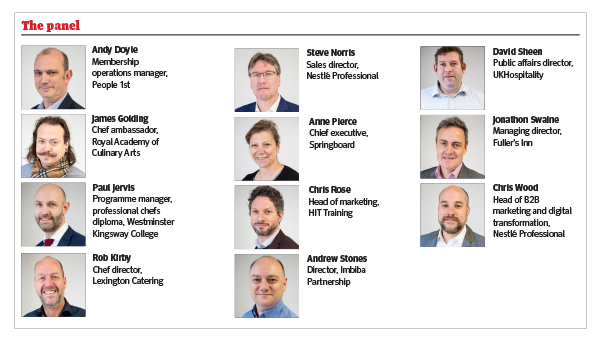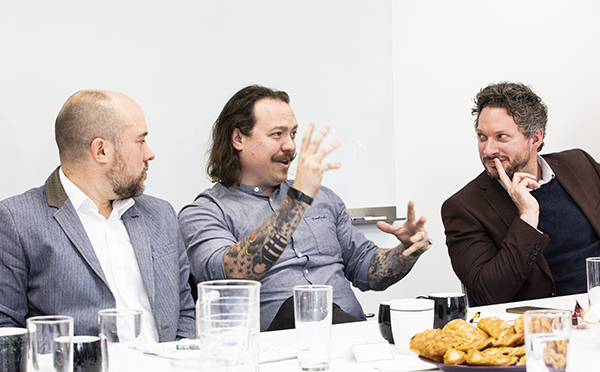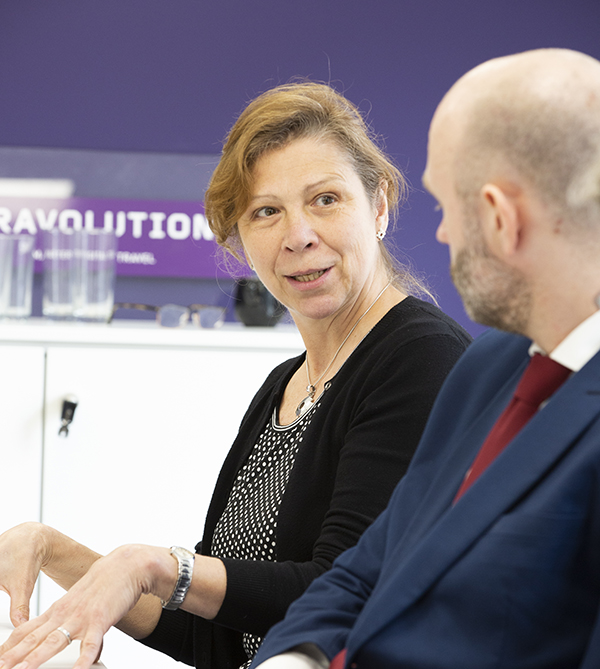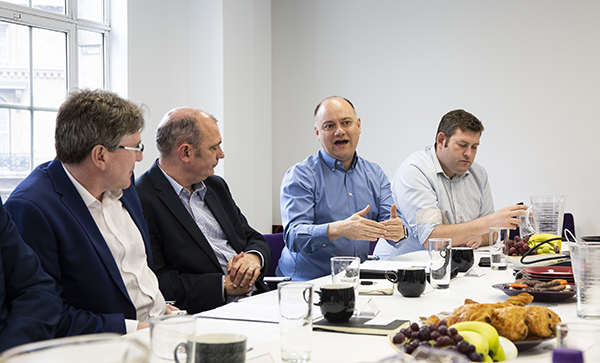What are the biggest challenges facing the catering and hospitality sector with the recruitment of young people? Richard McComb took a ringside seat at a discussion chaired by The Caterer in association with Nestlé Professional
The recruitment and retention of trainees, the role of competitions and mentors, and the pervasive influence of social media came under the spotlight at an insightful roundtable discussion chaired by The Caterer. At the heart of the conversation was the future sustainability of the hospitality industry, complemented by broad recognition of the need to adapt and change to attract talented young people. A co-ordinated approach to education, training and industry partnerships, backed by the government, will be crucial, the panellists agreed.
It was fitting that the discussion, held at The Caterer's offices in London and chaired by products and suppliers editor Lisa Jenkins, took place on the eve of one of the UK's pre-eminent showcases for young talent, the Nestlé Professional Toque d'Or. Now in its 31st year, the competition challenges chefs and front-of-house students in real-life situations. The Toque d'Or has itself moved with the times to reflect changes in education provision and now has a competition for apprentices.
The battle to attract new talent to the industry was flagged up as a major concern in a recent survey by Nestlé Professional. In a snapshot of the industry commissioned for the Toque d'Or, the trend towards sustainable eating was a major highlight. However, the industry skills gap also remains a pressing concern with nearly a third (30%) of foodservice professionals agreeing that recruitment is one of the biggest challenges in 2019.
What are the main issues currently facing the industry?
James Golding (JG): Staffing. There are particular problems finding staff at the chef de partie level, which is what prompted us at the Pig to set up an apprenticeship programme. We actually went through a year when we couldn't get any chefs from the colleges, so we just decided to train them ourselves.
Our chefs prefer taking young people on direct entry from school and they like the fact they live locally and have family support. But schools are generally more interested in getting children into university rather than promoting vocational roles, which hampers chef recruitment.
Paul Jervis (PJ):
Anne Pierce (AP): The staffing crisis is causing issues for everyone. The Springboard FutureChef programme, aimed at young people aged 12 to 16, is one of the country's most successful industry engagement tools. But we need more professional chefs to come forward and work with schools. Young people are inspired by chef engagement. At the moment, we have 450 professional chefs nationwide signed up to the programme to cover 600 schools. The problem is that everyone is stretched in the industry.
Andy Doyle (AD): Catering college students could be powerful advocates for the industry, going into secondary schools in ambassadorial roles to talk to and mentor pupils. They are the ones who are going to connect with those aged 11 to 14. One of the issues you have in schools is you've got food teachers and very few of them are specialists. The schools are crying out for students to go in.
How do we solve the staffing crisis?
David Sheen (DS): We're working with the government on a sector deal to boost recruitment and plug the skills gap. Government is keen to move forward, and I think we are close to getting a sector deal over the line.
We hope this deal will provide an industry-wide structure that would build on the outreach work already being carried out. But sometimes we pull in different directions, albeit with the best of intentions. A sector deal would allow the industry to maximise its current activity, only on a larger scale. It's not about replacing what people are doing individually. It is about harnessing that.
What is putting young people off a career in hospitality?
Rob Kirby (RK): I'm not sure television has done us loads of favours. Everyone has an interest and opinion on food now. They also think they are going to leave school at 16 and become Jamie Oliver. What we learned from our apprenticeship scheme was that 16-year-olds are very different to when we were 16-year-olds some 30 years ago. Now they are a very different generation. If you get them to set their alarm clock and they get in to work on time, that's an achievement.
When we set our apprenticeship up, I thought it would be a great idea to give it to a lot of superstar chefs in hardcore kitchens. Actually, it was a mistake. The kitchens with a little less pressure and a little more time worked best for young people because the chefs were able to wrap their arms around them and give them a lot of love.
PJ: The industry is at a crossroads. We have two options. We either sit and moan about it, or we accept that this generation is different. The thing I notice with most 16-year-olds is resilience - it's a major, major problem. They are growing up on Instagram, where everything is stylised perfection and filtered. I went to a school recently and did a careers day and I just took a box of apples and a peeler and said, "Who can peel the longest peel?" And they wouldn't have a go, not one of them. They don't want to fail.
This generation thinks everything has to be done perfectly or it's not worth doing. If we can break that down and say to them, "There's no problem with failure. Actually, we see failure as a tool to grow," then we'll get somewhere.
Jonathon Swaine (JS): We need a joined-up approach with government backing, so all these initiatives that we run can add up to something greater than the sum of their parts. If we keep stripping back [on training and engagement], we won't have an industry left. If finance directors are always controlling that conversation, we won't be able to build the team we need for the future.
It's got to start with a senior level agreement around what's important for the business when it comes to people. Decide among the team what things you want to invest in and what things you don't. But given the state we are in and the challenges we face, the 'people' bit has to be ring-fenced. You decide around the board table what you de-prioritise, because if you carry on stripping back, you won't have a business left.
Andrew Stones (AS): It's vital to demonstrate how education and training programmes translate into career progression in the hospitality industry.
Young people are looking for very clear development plans. There's a large element of "what's in it for me?". I used to be managing director at Be At One, and young people would start with us but then ask, "How quickly can I become a manager? If I do that, how quickly can I get my own bar? How quickly can I replicate what you have done and have a chain of bars?" There is an element of instant gratification and a clear understanding of, "If I do this, what do I get for it? Is there reward? Is there recognition? Is there extra pay or further development?"
Chris Rose (CR): Young industry professionals make effective role models for apprentices because they speak the same language. Companies need to invest in their digital presence, as most young recruits use websites as a first port of call. Lots of websites are a turn-off because they were too commercially orientated and they simply don't appeal to 16-year-olds.
We used to rely on putting a job opportunity on a jobs board and not worry about the website and people would still come to us. Now we are in a red ocean. Going to a careers fair, there are so many other sectors out there.
What part do competitions play in motivating young recruits and senior members of staff?
RK: At Lexington, competitions reflect wider social trends and eating preferences. In a first last year, chefs had to use vegetables for their starter, main and dessert. This year, for the aptly titled LexChef Trashed, we challenged chefs to use wasted products, sustainable breeds/cuts and byproducts, utilising produce ordinarily thrown away. It moved the competition 10 steps forward. They made pesto with carrot tops. It was brilliant, and the best client event for years.
Chris Wood (CW): Trainees, both kitchen and front-of-house teams, flourish in competitive environments like the Toque d'Or, whose theme for 2019 is sustainable futures. The pressure you can put people under in a competition allows them to find out more about themselves. It is an accelerator from that perspective.
The limitation of a competition is that it only touches the people involved. So, we are challenging ourselves as to how we can extend the reach of the Toque d'Or to really impact not just those people but everyone. It is something that digital allows us to do. It's a powerful tool to inspire the next generation.
Steve Norris (SN): It seems apparent from this discussion that a great deal of work is taking place throughout the industry to address recruitment and retention. From our perspective, we are all about giving young talent the trends and sustainable messaging and hopefully giving them a career in a great industry that lots of people are passionate about.
The winners of the Nestlé Professional Toque d'Or will be announced at the awards ceremony at the Royal Lancaster London on 14 June
Continue reading
You need to create an account to read this article. It's free and only requires a few basic details.
Already subscribed? Log In













